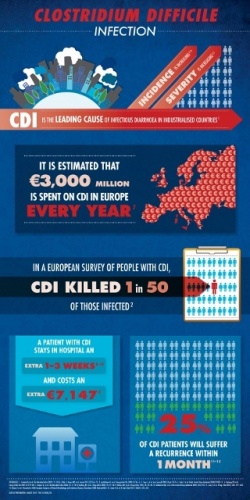Europe’s policymakers on diagnosis and management of CDI
Clostridium difficile infection (CDI), a potentially fatal disease, is one of the most common healthcare-associated infections
Urgent action is needed to improve the diagnosis and management of CDI, which is the main cause of hospital-acquired (nosocomial) diarrhoea in industrialised countries. In a report launched today, during a meeting hosted by the European Healthcare and Hospital Federation (HOPE), experts from across Europe highlight the current deficiencies in the management of CDI and outline the steps that are needed to address them.

Hospital patients with CDI are up to three times more likely to die in hospital (or within a month of infection) than those without CDI. Furthermore, CDI has an enormous impact on healthcare systems and infected patients can stay in hospital an extra 1–3 weeks at an additional cost of up to €14,000, compared with patients without CDI. The reported levels of CDI across Europe vary widely. However, failure to detect CDI cases leads to confusion about the true incidence of this HAI. A recent comprehensive incidence study was carried out in Spain, in 2010, and found that two thirds of CDI cases were undiagnosed or misdiagnosed.
The CDI in Europe Report, written by a group of leading European infectious disease experts with the support of Astellas Pharma Europe Ltd., demonstrates how CDI threatens patient safety and the quality of care provided. The Report makes recommendations to improve CDI management, within the context of current EU policy initiatives, which call for increased awareness of the signs and symptoms of CDI to improve rates of testing and diagnosis as well as improved awareness of and compliance with guidelines for CDI therapy and infection control. The Report also makes a case for the introduction of national-level surveillance systems in all Member States and increased patient education and awareness.
“It’s vital that governments see CDI management as a key indicator of patient safety and quality of care, and ensure that robust systems are in place to address it”, comments Professor Mark Wilcox, Professor of Medical Microbiology at the University of Leeds and one of the CDI in Europe Report authors. “CDI is a problem in hospitals and nursing homes and can be a major drain on healthcare resources. I believe implementation of the recommendations made in this Report will help improve the recognition of CDI and subsequently lead to a reduction in its incidence and impact on patients’ lives.”
The Report identifies a number of reasons why CDI is not being well managed. In many countries there is an inadequate level of awareness of CDI among doctors and other healthcare workers, resulting in under-diagnosis. Where this happens treatment is delayed or omitted, leading to increased morbidity and complications in the treatment of co-existing diseases. Proactive infection control measures may also be delayed, risking further outbreaks. Additionally, only a third of European countries have a nationally recommended diagnostic test algorithm for CDI, with testing in nursing homes and the community being particularly limited.
“We welcome this Report and its recommendations to improve the management of patients with CDI”, says Pascal Garel, Chief Executive of the European Hospital and Healthcare Federation (HOPE). “Healthcare-associated infections, especially CDI - a prominent infection in Europe, are of paramount concern to hospitals. We have solutions and good practices - the goal now is to increase our efforts to promote them across Europe to address HAIs and reduce their burden on European hospitals and patients.”
A full copy of the Report and its recommendations are available from www.epgonline.org/anti-infectives-knowledge-network/index.cfm.
22.04.2013





